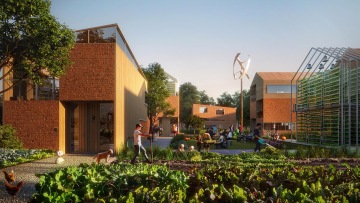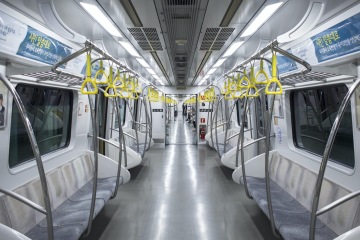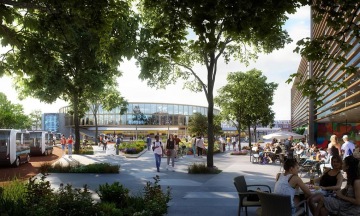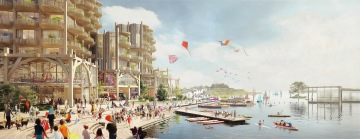
Bianca Wylie on the Critical Design Process of Democracy in Smart Cities
Bianca Wylie is a Toronto-based, open-government advocate among the early critics to raise concerns about privacy issues of the Sidewalk Lab’s now-defunct controversial smart neighborhood proposal on Toronto’s waterfront land.
Crowned the "Jane Jacobs of smart cities" (CityLab), Bianca Wylie’s fierce advocacy calling for transparency over the proposed smart city project, Sidewalk Toronto—a tech-heavy, eco friendly neighbourhood being developed by the subsidiary of Google parent company Alphabet—has earned her that notoriety. She is also the co-founder of Tech Reset Canada and a Senior Fellow at global think-tank: Centre for International Governance Innovation with a dual background in technology and public engagement.
Watch: Bianca Wylie on the Power of the Collective
Smart cities are nothing new, but these concerns put the project under a microscope, excavating its surveillance capitalist agenda. Critics probed for whether this sort of technology is here to commoditize society rather than serve it. In the Washington Post, Bianca warned of the smart city industry becoming "a Trojan horse for technology companies, coming in under the guise of environmentalism and improving the quality of life" but really in it for money.
The smart city industry is a Trojan horse for technology companies. They come in under the guise of environmentalism and improving the quality of life, but they’re here for money.
However, recent developments with the on-going dispute between urban planning division of Google parent company Alphabet and urban tech-privacy advocates came to a head with the tech company’s dropping of the Toronto quayside smart city project last week.
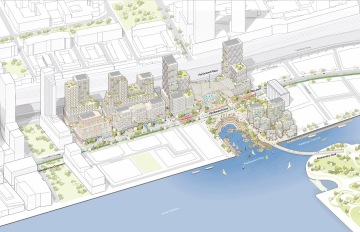
Bloomberg argued “Sidewalk Labs’ failure signals how much attitudes toward big technology companies and their influence over our lives has shifted in recent years. If a company like Alphabet, with its talent and resources, can’t pull off such a project, it’s not clear anyone can.” with former reSITE curator Greg Lindsay expressing that this may be "the defeat of the privately owned city.”
As they say, the battle here may have been won on private companies commoditizing public space, but the war on privacy seems far from over. Sidewalk Toronto’s fate has become nothing more than an idealistic render of possibility, but it opened up a new conversation on how we handle technology in our public spaces. A discussion that is evolving as the use of digital surveillance has become more normalized in effort to help curb the spread of COVID-19 in countries like China and India. The question Bianca proposed is still relevant—how are we going to regulate the use of smart cities while preserving privacy in our future cities?

Late last year, Bianca delivered a powerful presentation reminding us of our collective power and the value of the democratic process at reSITE REGENERATE while unearthing the hidden agendas of Sidewalk Lab’s meddling in public space for profit. At the core of Bianca's work is the upholding the importance of our public institutions, that have lagged behind in developing mechanisms for regulating such projects. Her vocal opposition cast a spotlight on the implications of data mining conducted by private corporations.
We know how to act together and my greatest fear is that we're forgetting that we have collective power.
"For two years I have been working with others to advocate for this city and for the role of the government because my fear right now is that corporations are beginning to sound a lot like governments, and sometimes I can't believe that I have to remind people this: they do not operate on the same basis." During her reSITE lecture, Bianca discussed the critical time we are in—one where we need to rebuild, empower and trust our institutions in order to keep the roles defined.
Related: Building Human-Centered Smart Cities with UNStudio
Bianca reminded us that “we know how to act together and my greatest fear is that we're forgetting that we have collective power” and that “this is the moment for government, institutions, and people to know that if we don’t build up our democracies right now, it is highly likely that people with power will decide they aren’t working well enough - so we’ll do work arounds.” But, if we “participate in these spaces very thoughtfully and remember that right now there is a moment for cities to rise to protect from the worst instincts of states."
We can have hard conversations with joy and with love, I think it's our responsibility. Let's make sure that we're addressing and using design for both of these things.
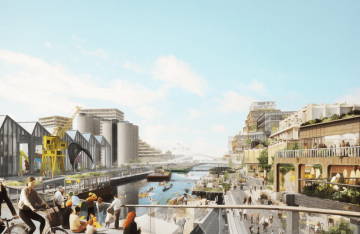
The design of process in democracy is critical, and it is specifically city institutions that should be the bulwarks of democratic resistance to hegemonies of both national governments and big corporations. Bianca believes the solution is found in coming together as a collective to design those processes and uphold democracy by having what may be hard conversations on how we regulate new technologies in public space. She closed her talk stating “we can have hard conversations with joy and with love, I think it's our responsibility. Let's make sure that we're addressing and using design for both of these things.”
Bianca Wylie spoke at reSITE 2019 REGENERATE. Her lecture was also featured during Dezeen's Virtual Design Festival.
More Ideas on Navigating Smart Cities
Human-Centered Smart Cities with Marianthi Tatari
Associate Director and Senior Architect at UNStudio, Marianthi Tatari, dissects different aspects of city-making that threaten the quality of life such as mono-functional spaces and commoditized smart cities and how to approach designing them with optimism. Photo courtesy of UNStudio
What Topics Will Define Cities in the 2020s?
We take a deeper look into some of the issues and topics that will shape our cities and the lives of its dwellers as well as what remedies could build better cities in the decade to come.
Seven Ways COVID-19 is Reshaping our Cities
The novel virus COVID-19 has upended our lives. As it spreads across the globe, it is keeping us contained in our homes and reshaping our relationships with cities.
Marianthi Tatari on High-Tech, Human-Centered Cities
Associate Director and Senior Architect for UNStudio, Marianthi Tatari, says that technology is the driving force behind the design for uncertainty and the future of our cities.
